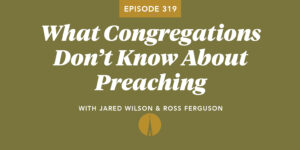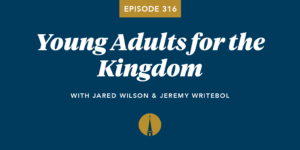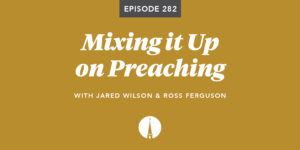
Episode 319: What Congregations Don’t Know About Preaching
What’s the big deal? You’re just standing up there, talking. On this week’s episode of the For The Church Podcast, Jared Wilson and Ross Ferguson suggest some things about preaching the average church member may not know. Some misunderstandings, misperceptions, and even mis-aimed appreciations.

Episode 316: Young Adults for the Kingdom
Was Gen-Z at TGC? Beginning with that strange question, today’s episode of the FTC Podcast transitions to a conversation about the calling of young adults for Christ’s kingdom. At some point in the last fifty years, our society began to see the young adult years as a season of life when you can just “figure things out” and have as much fun as possible while you do. Of course, our teens and twenties can be fun. And no college student or young adult in a first job can know what the next ten to fifteen years will hold. But these decades are also the launching pad for the rest of your life. Young adults will have opportunities to make an eternal difference. After all, they’re on mission now. Jesus’s commissioning is all that is needed to love God, love people, and witness to the truth of the gospel. Jared Wilson visits with returning guest, author and pastor Jeremy Writebol, about his new book Make It Your Ambition, which presents young adults with seven worthy pursuits to ignite young people’s imaginations to discover what a life marked by robust, gospel-fueled, and Spirit-filled obedience can look like.

The Sea and the Hills Sing His Praise
Why Israel’s Coastal Plain and Galilean Hills Matter for Bible Study In the summer of 2023, a group of faculty and leaders from Midwestern Seminary had the opportunity to take a tour of Israel. Having arrived in the Holy Land, our first day of touring was a stunning experience. Each of the tour stops provided […]

Episode 11: Scripture
Nearly every pastor is accustomed to treating the Bible as a resource for content—for preaching and teaching, discipling and counseling. But in their “using” of the Bible, too often we forget to let the Bible use them. Nothing can be more important for the shepherd of God’s people to be nourished and empowered by the very voice of God himself. In this episode, Jared Wilson and Ronnie Martin examine the wisdom practice of reading, studying, and meditating on Scripture, reflecting on how pastoral ministry can only be sustainable when the word is “richly dwelling” in us.

A Bible for the People
Prince Frederick of Wittenberg did not want his university’s best professor to be killed, but he knew there was a real threat. Even before Martin had gone to Worms, Prince Frederick already guessed that he would be condemned by the emperor.
After the trial, Martin was given twenty-one days to change his mind. If he didn’t recant, his books were to be burned, and he was to be turned over to the authorities right away. If Martin was going to survive this verdict, he would need his prince’s help. So Frederick made a plan.

Episode 282: Mixing it Up on Preaching
This week on the FTC Podcast, Jared Wilson and Ross Ferguson a three-week mini-series, drawing out the usual podcast banter to specific subjects. No agenda; no plan. Just a free-form conversation — this week, on preaching. What is it? What should sermons do? What were the guys’ first sermons like? How have they grown over the years? What are some things beginning preachers should keep in mind? All that and more in this episode of “mixing it up.”

Episode 269: Jen Wilkin on Revelation
Revelation shouldn’t leave us fearful or confused, but its imagery and concepts often confound our modern ears. If all Scripture is God-breathed and profitable, though, we should assume Revelation is as accessible and helpful as any other book of the Bible. Teacher and author Jen Wilkin has written a new Bible study guiding readers through Revelation verse-by-verse to discover how the last book of the Bible is accessible, helpful, and speaks a steadying word of assurance and endurance to the church in every age. Wilkin joins Jared Wilson on this episode of the FTC Podcast to discuss. https://www.lifeway.com/en/product-family/revelation-bible-study

Episode 268: FTC Mailbag
On this installment of the regular Mailbag feature of the FTC Podcast, Jared and Ross discuss the alleged pastor deficit, benevolence ministry, dealing with disqualified leaders in inter-church events, young adult Bible studies, should pastors attend Sunday School?, and more!

Episode 262: Awesome Moms of the Bible
In an episode in anticipation of Mother’s Day, Jared and Ross talk about their favorite biblical moms.

A Word of Hope: Reflecting on Luther’s Lectures on Genesis
I teach church history as part of my profession. In doing so, I’ve discovered it to be exactly what my teachers described—a wonderful means of keeping the faith. Of the figures from our past who have helped me, Martin Luther stands at the top of the list, as he continually points me away from myself […]

